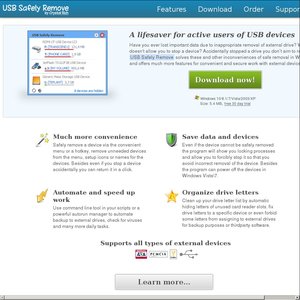A lifesaver for active users of USB devices
Have you ever lost important data due to inappropriate removal of external drive? Windows doesn't allow you to stop a device? Accidentally stopped a drive you don’t aim to remove? USB Safely Remove solves these and other inconveniences of safe removal in Windows and offers much more features for convenient and secure work with external devices.
Comparison with built-in Windows feature: http://safelyremove.com/usbsafelyremove-vs-windows.htm
Direct download for the file: http://safelyremove.com/startdownload.htm?v=5.3gtd2
Note: I originally received the email from giveawayoftheday, downloaded the files and it turns out you can download the file directly from the developer site.
Expires in 18 hours
![[FREE] USB Safely Remove Software](https://files.ozbargain.com.au/n/23/230623.jpg?h=1906d477)

Free feature of windows since 95?